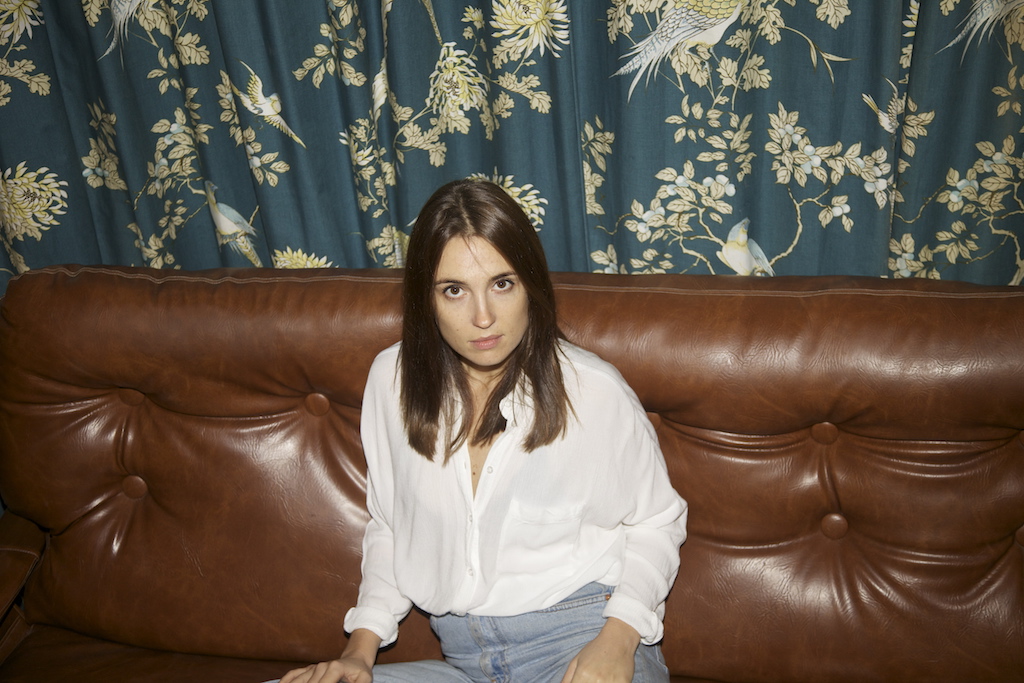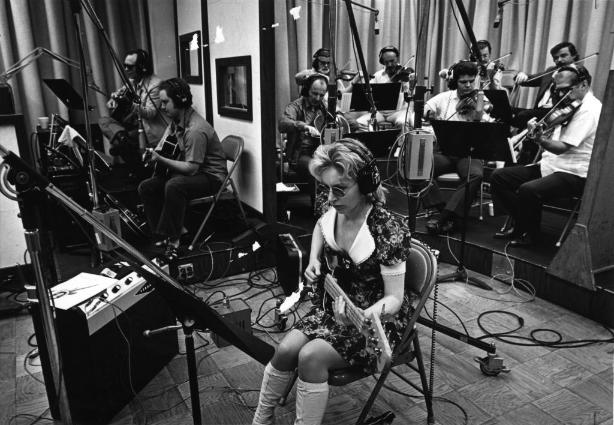Ali Barter: It’s About Fucking Time We Gave Female Musicians The Credit They Deserve
"Women are taught from a young age to cooperate in the industry, to survive, and it’s getting boring."

I am a musician, a singer, and performer. I get to turn my passion into songs. I’m also a woman and a student of the music I love, and I recently shared a post on my artist Facebook page expressing my frustration at the underrepresentation of women in my 20th Century music history class.
The post included an illustration of Sister Rosetta Tharpe, a black woman who is widely recognised as one of the early forebears of rock’n’roll — but not nearly as well known as her male counterparts. She was a total badass.
In doing this, I wanted to call attention to the ‘master’ narrative we have when talking about music history, from which most schools take their lead. It focuses on men and largely excludes women; it is written in textbooks; and it minimises all we have done and continue to do.
Women are taught from a young age to cooperate in the industry, to survive, and it’s getting boring.
A Groupie, A Muse, Or A Support Act
While growing up, I learned that a women’s chief purpose in music is to play the supporting role to men. Sure, there were mentions of women in my classes, but it was buried in the extra reading and centred on their capacity to be a muse; to inspire the ‘serious art’ of a man.
We heard about Linda Keith, a girlfriend of Keith Richards, who apparently introduced Jimi Hendrix to the music of Bob Dylan. We heard about The Ronettes singing ‘Be My Baby’ during a class focussed on the songs of producer and ‘musical genius’ Phil Spector (didn’t he… murder a woman?).
This idea that women are present simply to provide a supporting role to men is pervasive. Yoko Ono is seen as the woman who ‘broke up’ The Beatles, but she was also a wildly experimental and revolutionary musician. Now in her eighties, she’s an undeniably prolific artist. To see her simply as a groupie who bewitched a giant of music is completely false, but it’s also an easy narrative to accept, and one that many continue to.
“You learn that the only way to get rock-star power as a girl is to be a groupie and bare your breasts and get chosen for the night. We learn that the only way to get anywhere is through men. And it’s a lie.” – Kathleen Hanna
A more recent example was the praise given to Ryan Adams’ version of Taylor Swift’s album 1989. Many critics gushed, claiming it brought meaning to an otherwise superficial pop record. The fact that Swift is one of the most powerful musicians in the world, or that this record sold 1.2 million copies in its first week of release in the US alone, isn’t even the point; it is that she wrote the songs. She didn’t need a man to legitimise them as ‘art’.
This exclusion doesn’t only happen in music. What about the invisible and forgotten female painters or writers who had to assume a man’s name to get their work published or taken seriously? Louisa May Alcott, author of Little Women, took on the name A.M. Barnard when writing her gothic thrillers because the subject matter was considered ‘unladylike’ for the times. Even J.K. Rowling assumed ambiguous initials because her publisher though that Harry Potter’s young male audience would be put off by a female writer.
The exclusion of women from art history was famously called out by feminist protest group The Guerilla Girls in their 1989 campaign. They highlighted the fact “less than 5 percent of the artists in the Modern Art Sections (of the Metropolitan Museum of Art in New York) are women, but 85 percent of nudes are female”. They asked the question: ‘Does a woman have to be naked to get into the Met Museum?’ This year, in an interview on The Late Show With Stephen Colbert, one of the founding members of The Guerilla Girls stated that such a history “is not really a history of art, it is a history of power.”
Of course, I do understand that things were different for men and women 100, 50 and even 20 years ago. Perhaps it was normal in times-gone-by that there were less women participating in music, art or, for that matter, in business and politics. The problem is that it is now 2016. So why are we still adhering to these old fashioned ideas and a limited narrative of a past we now know to be unjust? It is in educational institutions that culture is shared and spread; and it is high time that women stop getting left out of the stories that matter.
Standing Up For The Real Badasses
When I wrote my Facebook post about all this, I made two basic points. One: that the version of music history I’ve been offered is inaccurate. And two: that such a narrow history is boring. If we were taught a broader and more inclusive history of music, a history that includes all different types of influential people, our understanding of music would become deeper, our lives would be richer, and we would have a bigger selection of heroes to inspire us.
How will young girls learn that they are valued as artists, and that they have the permission not only to sing, but to play guitar, to play drums, to play whatever they want, and make whatever music they want, if they can’t learn about the long and proud history of the women who came before them? Not only were they creating art and influencing other musicians, they did it in a time when society wanted to silence them. They were the true badasses of music.

Carol Kaye was a legendary bass player for The Beach Boys and Neil Young, but you probably haven’t heard her name before.
Over the weekend I read a blog post that has since gone viral, about how many women have an instinct to minimise anger and try to avoid situations that may result in conflict. It referenced the fact it can feel uncomfortable to call out predatory behaviour and that women are often made to feel they are overreacting. It is a response we see time and time again when women speak up about the inadequacies of the female position in society, and although my school wasn’t predatory, it did contribute to this pervasive rhetoric.
Shortly after making my Facebook post, I was invited to meet my lecturer and a school administrator. In the meeting, I was told my statement was factually incorrect (as there were more women featured in the broader background content), I was asked to apologise, and I felt pressured to take the post down. The irony is that my post was about women in music being silenced, overlooked, forgotten, and suppressed. By asking me to publicly apologise and retract my statement, weren’t they doing the same? Could no one acknowledge that, yes, it may be unbalanced that of 24 artists prominently featured in a given semester, only one is female?
I did take down the post, and I did apologise to my lecturer — because I don’t want this to fall on him. The problem isn’t him, but a broader perspective on the role of women in our history books. I knew what I had felt when reading over the lecture notes. I knew what I had felt alone in the room with them when they told me I was objectively wrong. I still believe that the amount of female inclusion in our coursework is unacceptable.
So, although I removed my Facebook post, I stand by my statement and its central argument: women were and continue to be musical pioneers, their contributions have been hidden from the music history we are taught, and it’s about fucking time we fixed that.
–
Ali Barter is a Melbourne musician. She’s touring her new single ‘Girlie Bits’ this month. Details here.